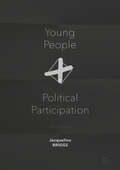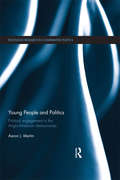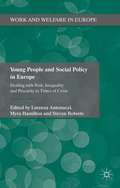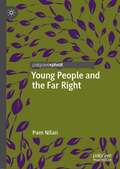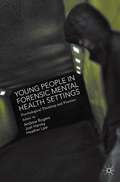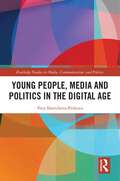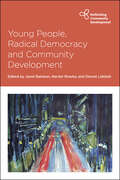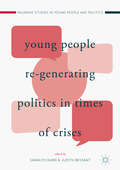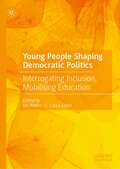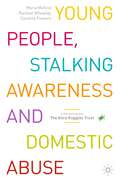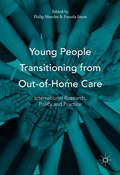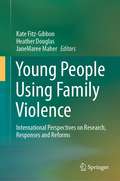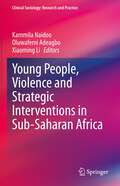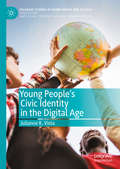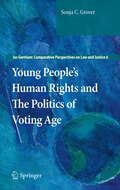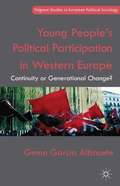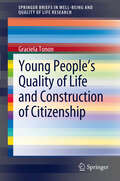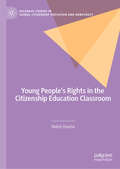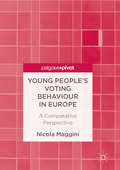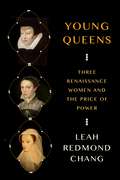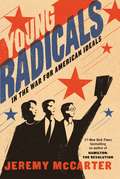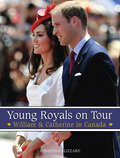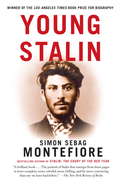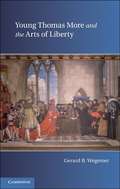- Table View
- List View
Young People and Political Participation
by Jacqueline BriggsThis book analyses the various ways and the extent to which young people participate in politics, focusing primarily on the UK and including cross-national comparisons where relevant. It covers topics including: what is meant by political participation; youth political participation on a pan-European basis; new social media and youth political participation; whether the voting age should be lowered to 16; youth participation at the local level; and young women and political participation. Written in a lively and engaging style, the book provides a detailed investigation into the extent to which young people in the twenty-first century are interested and participate in politics. The author has included interviews with many young people, as well as with academics and specialists in the field. The book's greatest contribution is to the debate surrounding whether or not the voting age should be lowered to 16 - a timely and thought-provoking analysis.
Young People and Politics: Political Engagement in the Anglo-American Democracies (Routledge Research in Comparative Politics)
by Aaron MartinThis book examines young people’s political engagement in the Anglo-American democracies. It is often alleged that young people are disengaged from politics on a number of levels. The commonly held view is that young people don’t vote, they do not trust politicians and have low levels of political interest. But is this true, where is it true and to what extent? Examining voter turnout, political trust, political interest, electoral and non-electoral forms of participation and Internet use, this book provides a comprehensive account of young people’s political engagement in the US, Britain, Canada and Australia. In doing so this book challenges the conventional wisdom on a number of fronts by showing young people’s political engagement to be much more complicated than many of the stereotypes suggest (in both good and bad ways).In this way, this book provides a report card on young people’s political engagement in the twenty-first century. Young People and Politics will be of interest to students and scholars of political science, comparative politics, public policy and sociology, particularly those with a focus on young people and politics, political participation and public opinion.
Young People and Social Policy in Europe
by Lorenza Antonucci Myra Hamilton Steven RobertsThis edited collection provides the first in-depth analysis of social policies and the risks faced by young people. The book explores the effects of both the economic crisis and austerity policies on the lives of young Europeans, examining both the precarity of youth transitions, and the function of welfare state policies.
Young People and the Far Right (Alternatives and Futures: Cultures, Practices, Activism and Utopias)
by Pam NilanThis book looks at how young people get attracted to the Far Right, especially young white men. We may never know why a young individual ends up there, yet two things are obvious. First, Far Right propaganda appeals to the fantasy imagination and to the emotions. Second, supporting the Far Right is a decision often made by digitally-networked 15-25 year olds looking for answers and wanting to express their anger. However, many later become aware of a yawning gulf between the ideal future they envisioned, and what happens in the here and now. Accounts of the Far Right often focus on terrorist events, plots or extreme acts of violence. However, the emphasis here is on rather ordinary young people and how they get involved in a social movement that promises adventure and belonging. The aim is to better understand how their hate practices are framed and channeled by the persuasive discourse of the Far Right.
Young People in Forensic Mental Health Settings: Psychological Thinking and Practice
by Joel Harvey Andrew Rogers Heather LawYouth crime and youth violence blights our communities and shapes the lives of many, whether they are victims, perpetrators or family members. This book examines the application of psychological thinking and practice when working with young people who display high risk behaviours across a broad range of forensic mental health settings in the UK. It provides an up-to-date account of current thinking and practice in the field and the challenges of applying effective psychological approaches within forensic settings for young people. The contributors to Young People in Forensic Mental Health Settings are drawn from a range of environments including universities, youth offending services, secure in-patient settings, young offender institutions, Community Forensic Child and Adolescent Mental Health Services (F-CAMHS), and secure children's homes. This volume serves as an important platform for debate and as a forum for discussing the future delivery of psychologically informed services, intervention and mental health provision with young people who display high-risk behaviours.
Young People, Media and Politics in the Digital Age (Routledge Studies in Media, Communication, and Politics)
by Vera Slavtcheva-PetkovaThe book explores the relationship among young people, politics and the media. It presents a novel multidimensional analytical framework – The Circle Line Media Model, which accounts for the importance of a range of processes, actors and social structures in the political socialisation process. By defining political socialisation as a lifelong interactive process that develops civic cultures, collective identities and citizenship, underpinned by social structures, nationality and generational order, the author draws attention to its manifestation in acts of political participation and interactions with authoritative actors such as school/teachers, family, the media and friends/peers. The volume’s longitudinal study on young people, Europe and the media spanning 13 years of research in two very different countries also makes recommendations for more effectively engaging young people with politics and political media based on Generation Z’s own views about current deficiencies in their relationship with news media. Shedding new light on the changing nature of young people’s engagement with politics, this book will be of interest to researchers, lecturers/professors and upper level undergraduate and postgraduate students in the fields of media studies, communication and journalism studies as well as politics and sociology.
Young People, Radical Democracy and Community Development (Rethinking Community Development)
by Janet Batsleer, Harriet Rowley and Demet LüküslüYoung people are often at the forefront of democratic activism, whether self-organised or supported by youth workers and community development professionals. Focusing on youth activism for greater equality, liberty and mutual care – radical democracy – this timely collection explores the movement’s impacts on community organisations and workers. Essays from the Global North and Global South cover the Black Lives Matter movement, environmental activism and the struggles of refugees. At a time of huge global challenges, youth participation is a dynamic lens through which all community development scholars and participants can rethink their approaches.
Young People Re-Generating Politics in Times of Crises
by Sarah Pickard Judith BessantThis book provides insight into the diverse ways young people from around the world are regenerating politics in innovative and multifaceted ways. The authors, who include academics and activists, challenge claims that young people are apolitical, apathetic and living up to the ‘me generation’ stereotype. Contributions cover a rich body of case examples of traditional and new forms of youth politics in response to situated injustices and political and socio-economic crises. Significant and optimistic, the collection presents strong evidence from across the globe that these developments are not isolated incidences, but are in fact part of a systemic, large-scale transformation leading to a regeneration of the political landscape by young people. The book is aimed at students and scholars in the fields of politics, sociology, policy studies and youth and childhood studies.
Young People Shaping Democratic Politics: Interrogating Inclusion, Mobilising Education
by Ian Rivers C. Laura LovinAt a time when political mobilisation is a symptom of social dissatisfaction, young people’s participation in political decision-making, practice and ideological change, make foregrounding and investigating their political practices a necessity. The title of this book, Young People Shaping Democratic Politics: Interrogating Inclusion, Mobilising Education clearly announces its intention, subject, and mission. This collection has been inspired by topical youth mobilisations that aim to address injustices and inequalities which are rooted in poverty, austerity, violence, increased surveillance, climate change, dislocation, xenophobia, the rise of authoritarian regimes, and a global turn to the political right. Whereas young people are politicised in moments of conflict and become symbolic conduits for the future of their nation, they represent a category most often relegated to the apolitical sphere before and after such moments of crisis. This edited collection seeks to expand our engagement with inclusion beyond educational institutions by situating young people at the centre of our inquiry, as agents of political processes that promote, problematise and re-imagine inclusive societies. The chapters engage in contemporary case-studies, which are mapped across a wide range of countries from Europe (Serbia, Spain and United Kingdom), North Africa (Egypt), South Africa, North America (United States), South-Asia (Bangladesh), and West Asia (Lebanon).
Young People, Stalking Awareness and Domestic Abuse
by Maria Mellins Rachael Wheatley Caroline FlowersThis book addresses domestic abuse and stalking among young people in the UK and Ireland, with a focus on intersectionality and lifestyle settings. In partnership with the Alice Ruggles Trust, this book draws on a wealth of expert contributions including those with lived experience, frontline services such as Paladin National Stalking Advocacy Service, charities EmilyTest and Hollie Gazzard Trust, researchers of so-called honour-based abuse and online harms, and forensic psychologists who work with people who stalk. It begins with an overview of ways to recognise harmful behaviours, including those carried out online. The discussion then moves on to methods and motivations of stalking and coercive control and the various lifestyle contexts including education environments, young people in the workplace, and the role of the police and frontline support services in tackling these issues. It is a vital resource for undergraduate students across criminology, sociology, law, psychology, education, social justice, policing, and forensic psychology, as well as a combination of academic researchers and professionals working within stalking and domestic abuse support and prevention. This action-orientated book also includes 'Key Points' and ‘Discussion Questions’ in each chapter to direct student learning in the classroom and to create discussion points for wider readers.
Young People Transitioning from Out-of-Home Care
by Pamela Snow Philip MendesThis book challenges and revises existing ways of thinking about leaving care policy, practice and research at regional, national and international levels. Bringing together contributors from fifteen countries, it covers a range of topical policy and practice issues within national, international or comparative contexts. These include youth justice, disability, access to higher education, the role of advocacy groups, ethical challenges and cultural factors. In doing so it demonstrates that, whilst young people are universally a vulnerable group, there are vast differences in their experiences of out-of-home care and transitions from care, and their shorter and longer-term outcomes. Equally, there are significant variations between jurisdictions in terms of the legislative, policy and practice supports and opportunities made available to them. This significant edited collection is essential reading for all those who work with young people from care, including social workers, counsellors, and youth and community practitioners, as well as for students and scholars of child welfare.
Young People Using Family Violence: International Perspectives on Research, Responses and Reforms
by Kate Fitz-Gibbon Heather Douglas JaneMaree MaherThis book examines the use of violence by children and young people in family settings and proposes specialised and age-appropriate responses to these children and young people It interrogates the adequacy and effectiveness of current service and justice system responses, including analysis of police, court and specialist service responses. It proposes new approaches to children and young people who use violence that are evidence based, non-punitive, and informed by an understanding of the complexity of needs and the importance of age appropriate service responses.Bringing together a range of Australian and International experts, it sheds new light on questions such as: How can we best understand and respond to the use of family violence by young people? To what extent do traditional family violence responses address the experiences of adolescents who use violence in family settings? What barriers to help seeking exist for parental and sibling victims of adolescent family violence? To what degree do existing support and justice services provide adequate responses to those using adolescent family violence and their families? In what circumstances do children kill their biological and adopted parents?The explicit focus on child and adolescent family violence produces new knowledge in the area of family violence, which will be of relevance to academics, policy makers and family violence practitioners in Australia and internationally.
Young People, Violence and Strategic Interventions in Sub-Saharan Africa (Clinical Sociology: Research and Practice)
by Kammila Naidoo Oluwafemi Adeagbo Xiaoming LiThis edited volume offers a rich collection of up-to-date research and critical scholarship from various African institutions on incidents of youth violence, intervention and prevention in sub-Saharan Africa. It integrates thinking, evidence, responses, and debates relating to this topic, laying the basis for fresh insights and innovative strategies. The chapters capture a spectrum of pertinent issues such as economic hardship, lockdowns, sexual and reproductive health, pregnancy, online sexual harassment, xenophobic violence, and micro-aggressions in school contexts, and present guidelines on how countries might learn from successful interventions recently implemented. They explore young people’s access to familial and community resources, state-sponsored initiatives, peer counselling, youth-friendly services, and other relevant structures. Thus, among other things, this volume stimulates further debate on what is driving violence in different African contexts—specifically, how intersectional identities create vulnerabilities to violence—and influences ways of dealing with the issue. This interdisciplinary and cross-cutting volume serves as a vital resource for experts at universities, in international organisations, civil society groups and intergovernmental organisations who wish to both analyse and take action to address and prevent the type of violence that currently afflicts young people sub-Saharan Africa today.
Young People's Civic Identity in the Digital Age (Palgrave Studies in Young People and Politics)
by Julianne K. ViolaThis book explores young people’s civic experiences in contemporary American society, and how they navigate the political world in an era defined by digital media. Drawing on the experiences of young people before they have reached voting age, the book provides vital perspectives on citizenship and civic engagement of a part of the population that is often overlooked. The author engages with the tensions young people encounter in their everyday personal and civic lives, particularly in their understanding and experience of civic identity in ways that are shaped by society’s (mis)perceptions of youth. The book introduces a new framework of civic identity that has been directly informed by the lived civic experiences of young people themselves. The findings will be of great interest to researchers and students working in political science, sociology, youth studies, education studies, and media studies, as well as policy-makers, practitioners, and parents of young people.
Young People’s Human Rights and the Politics of Voting Age
by Sonja C. GroverYoung People's Human Rights and The Politics of Voting Age explores the broader societal implications of voting age eligibility requirements and the legislative bar against youth voting in North America and in Commonwealth countries (where 'youth' is defined as persons 16 and over but under age 18). The issue is raised as to whether the denial of the youth vote undermines democratic principles and values and ultimately the human dignity of youth. This is the first book to address the topic of the youth vote in-depth as a fundamental human rights concern relating to the entitlement in a democracy to societal participation and inclusion in influencing policy and law which profoundly affects one's life. Also examined are international perspectives on the issue of voting age eligibility. The book would be extremely valuable for instructional purposes as one of the primary texts in undergraduate or graduate courses on children's human rights, political psychology, political science , sociology of law or society and as a supplementary text for courses on human rights or constitutional law and would be of interest also to members of the general public concerned with children's human rights issues.
Young People’s Political Participation in Western Europe: Continuity or Generational Change? (Palgrave Studies in European Political Sociology)
by Gema M. García-AlbaceteAre young people today politically 'apathetic'? Or are they democratically 'mature' citizens? This book examines several types of involvement to reveal changes in young people's political participation in Europe in recent decades. It uses various concepts of 'age' to compare participation across countries and over time.
Young People's Quality of Life and Construction of Citizenship
by Graciela TononThe study of quality of life refers to the material environment (social welfare) and psychosocial environment (wellbeing). It has been defined as a concept that implies the objective and subjective dimension that Cummins (1997) first studied in seven domains. The use of domains in the quality of life study allows a more precise measurement than the one that could have been reached through simple questions, since psychometric scales are used and if the addition of domains is equivalent to the totality of life satisfaction, then the group of domains is a valid measure of quality of life. In the case of young people, it has been observed that even if they live in negative physical, social and contextual conditions, they can nevertheless experience a relatively positive experience in relation to their quality of life, depending on the strategies and capabilities that they generate in relation to the context. Similarly, young people that live in favorable socioeconomic conditions and with a trouble free psychological situation may experience a relatively poor evaluation of their position in life (Patrick et al). oung people do not form a homogenous group and, in this sense, it is not possible to generalize about youth; they interact with the environment in which they live and they are a product of the history they happen to live, in this way they transit different vital scenarios in daily life that affect their quality of life. The social representations about youth that each population has, in each historical moment, are embedded in the social context in which young people live and develop, conditioning every-day life and /or creating related stereotypes. The concept of youth is a social construction built conjointly by all members of society in the historical moment in which they live. Young people interact with the environment in which they live and they are a product of the history they happen to live. Authors like Urresti (1999) define youth from a point of view that takes into account the living together of different generations in different societies, thus being impossible to compare young people of today with those of two or three decades ago; in addition, he states that it is necessary to situate the understanding of youth within the historical and social moment in which they live. Nowadays the predominant adult model is based in individualism, and even if an intergenerational dialogue is necessary, it is difficult for young people to achieve this kind of communication with adults that, in some cases, are living "stages of youth" or that need to be "forever young". Young people live in uncertainty, with a limited perspective for future action, assigning their own meaning to events and facts, according to their fundamental concerns that are significantly different from those of their parents' generation. In the other side the process of globalization and the protagonist social role of the new informational and communicational technologies, produce that the possibilities to expand individual freedoms increase, but not all young people can manage with it (Lechner, 2002). What young people need in order to construct their citizenship and feel satisfied, varies according to the different societies, especially considering that most of them live a fragile situation. As Cortina (2003:7-9) states, the idea of citizenship always transcends individualism, because the citizen is somebody that exists together with others, and those others are equal to him before the city, is somebody that deliberates with others, that acts with others conjointly, that assumes the protagonist role of his own life, in this way citizen is not only that who the law protects, but that who participates in the public issues. Speaking about young people we propose to recognize them from their equal dignity because "recognition is not only a courtesy that we owe others: it is an essential human need" (Taylor, 1993:46). This recognition is based in human dignity and tends to protect the basic rights of people as individuals and to recognize the particul...
Young People's Rights in the Citizenship Education Classroom (Palgrave Studies in Global Citizenship Education and Democracy)
by Helen HannaThis book explores the rights held by young people in the citizenship education classroom in the divided societies of Northern Ireland and Israel. Against the backdrop of a long history of protracted conflict and division, the author analyses how international rights obligations are reflected in the contested citizenship education curriculum in secondary schools. Drawing upon extensive qualitative data as well as policy and curriculum documents, the author reveals that understandings of education rights can be oriented around three themes – minority group representation in the curriculum, dealing with difference through pedagogy, and preparing young people for life in a (divided) society. This can be mapped onto the 42-A rights framework where education should be ‘acceptable’ and ‘adaptable’. However, the variety of interpretations held by participants raises questions regarding the ‘universality’ of international frameworks for education rights, and the workability of such frameworks in the national and divided contexts. While the contexts of Northern Ireland and Israel have much in common, they are rarely compared: this book will show that their comparison is as relevant as ever, as issues of identity continue to affect everyday school life. This book will be of interest to citizenship and history education scholars, as well as those who are concerned with the application of international human rights law.
Young People’s Voting Behaviour in Europe
by Nicola MagginiThis book uses various concepts of 'age' to examine young people's voting behaviour in six European countries between 1981 and 2000. It addresses questions such as: what are the determinants of voting choices among young people, and to what extent are these factors different from those of adults? Through an innovative approach aimed at studying party choice with a strong empirical orientation, the author argues that age is less important in influencing voting choices than having been young and socialized to politics in a given historical period. Ultimately, values and political factors explain young people's voting choices more than social identities, which marks a change from previous generations. This book will appeal to students and scholars in comparative politics, electoral behaviour, party politics, and political sociology.
Young Queens: Three Renaissance Women and the Price of Power
by Leah Redmond ChangThe boldly original, dramatic intertwined story of Catherine de’ Medici, Elisabeth de Valois, and Mary, Queen of Scots—three queens exercising power in a world dominated by men.Orphaned from infancy, Catherine de’ Medici endured a tumultuous childhood. Married to the French king, she was widowed by forty, only to become the power behind the French throne during a period of intense civil strife. In 1546, Catherine gave birth to a daughter, Elisabeth de Valois, who would become Queen of Spain. Two years later, Catherine welcomed to her nursery the beguiling young Mary Queen of Scots, who would later become her daughter-in-law.Together, Catherine, Elisabeth, and Mary lived through the sea changes that transformed sixteenth-century Europe, a time of expanding empires, religious discord, and populist revolt, as concepts of nationhood began to emerge and ideas of sovereignty inched closer to absolutism. They would learn that to rule as a queen was to wage a constant war against the deeply entrenched misogyny of their time.Following the intertwined stories of the three women from girlhood through young adulthood, Leah Redmond Chang's Young Queens paints a picture of a world in which a woman could wield power at the highest level yet remain at the mercy of the state, her body serving as the currency of empire and dynasty, sacrificed to the will of husband, family, kingdom.
Young Radicals: In the War for American Ideals
by Jeremy MccarterFrom the co-author of the #1 New York Times bestseller Hamilton: The Revolution, the stunning story of five American radicals fighting for their ideals as the country goes mad around them. Where do we find our ideals? What does it mean to live for them—and to risk dying for them? For Americans during World War I, these weren’t abstract questions. Young Radicals tells the story of five activists, intellectuals and troublemakers who agitated for freedom and equality in the hopeful years before the war, then fought to defend those values in a country pitching into violence and chaos. Based on six years of extensive archival research, Jeremy McCarter’s dramatic narrative brings to life the exploits of Randolph Bourne, the bold social critic who strove for a dream of America that was decades ahead of its time; Max Eastman, the charismatic poet-propagandist of Greenwich Village, whose magazine The Masses fought the government for the right to oppose the war; Walter Lippmann, a boy wonder of socialism who forged a new path to seize new opportunities; Alice Paul, a suffragist leader who risked everything to win women the right to vote; and John Reed, the swashbuckling journalist and impresario who was an eyewitness to—and a key player in—the Russian Revolution. Each of these figures sensed a moment of unprecedented promise for American life—politically, socially, culturally—and struggled to bring it about, only to see a cataclysmic war and reactionary fervor sweep it away. A century later, we are still fighting for the ideals these five championed: peace, women’s rights, economic equality, freedom of speech—all aspects of a vibrant American democracy. The story of their struggles brings new light and fresh inspiration to our own.
Young Royals on Tour: William & Catherine in Canada
by Christina BlizzardA day-by-day celebration in words and photographs of the young couple’s first tour of Canada. On April 29, 2011, Prince William of Wales married Catherine Middleton at Westminster Abbey in London. The newlyweds’ first royal tour took place in Canada from June 30 to July 8. People across the country rejoiced with the couple as they made their way through a land that holds special significance for the Royal Family, emphasizing and renewing the bond with Canada. This was not the Duke of Cambridges first trip "home to Canada," since he accompanied his parents, Charles and Diana, in 1991 and his father and brother, Harry, in 1998. This journey included such highlights as Canada Day in Ottawa, dragon boating in Prince Edward Island, visiting homeless youth in Quebec City, street hockey in Yellowknife, and a side trip to help bolster the courage of fire-devastated citizens in Slave Lake, Alberta. The Duke and Duchess presented the vibrant, modern face of the Royal Family, and excitement followed them everywhere as they travelled across Canada.
Young Stalin
by Simon Sebag MontefioreBased on ten years' astonishing new research, here is the thrilling story of how a charismatic, dangerous boy became a student priest, romantic poet, gangster mastermind, prolific lover, murderous revolutionary, and the merciless politician who shaped the Soviet Empire in his own brutal image: How Stalin became Stalin.From the Trade Paperback edition.
Young Stalin
by Simon Sebag MontefioreFollowing up on his earlier Stalin: The Court of the Red Tsar (which won the History Book of the Year Prize at the 2004 British Book Awards), Montefiore here recounts the life of Soviet leader Josef Stalin up to the point of the October Revolution of 1917, focusing on "the intimate and secret, political and personal lives of Stalin and the small circle that ultimately came to create and rule the Soviet Union until the 1960s. " He justifies this focus by suggesting that the personalities and patronage of a minuscule oligarchy were the essence of politics under Lenin and Stalin and that, therefore, Stalin's early history of brigandage, political gangsterism, and paranoia are explanatory of much wider issues of Soviet history.
Young Thomas More and the Arts of Liberty
by Gerard B. WegemerWhat does it mean to be a free citizen in times of war and tyranny? What kind of education is needed to be a 'first' or leading citizen in a strife-filled country? And what does it mean to be free when freedom is forcibly opposed? These concerns pervade Thomas More's earliest writings, writings mostly unknown, including his 280 poems, declamation on tyrannicide, coronation ode for Henry VIII and his life of Pico della Mirandola, all written before Richard III and Utopia. This book analyzes those writings, guided especially by these questions: Faced with generations of civil war, what did young More see as the causes of that strife? What did he see as possible solutions? Why did More spend fourteen years after law school learning Greek and immersed in classical studies? Why do his early works use vocabulary devised by Cicero at the end of the Roman Republic?
